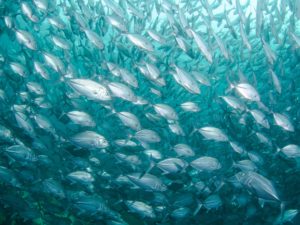Neonicotinoids don’t just harm bees, they decrease fish populations, too
 Photo Credit: Jean Wimmerlin
Photo Credit: Jean Wimmerlin
Neonicotinoids are neurotoxic pesticides commonly used in conventional agriculture since the early 1990s. They are now known to contribute to large die-offs of important pollinators and other beneficial insects. A new study in Science shows the consequences of neonicotinoids reach beyond invertebrates and are causing fish populations to crash. Researchers found that neonicotinoid applications to watersheds since 1993 were correlated with an 83% decrease in spring populations of zooplankton, which are important food sources for freshwater fish. They suggest that this die-off of zooplankton has caused smelt populations to crash and indeed, harvest has reduced from 240 tons to 22 tons in the lake they examined. This work reveals that the unintended consequences of pesticide use, particularly neonicotinoids, extend much further than previously thought, which should be considered when setting regulations for their use.


